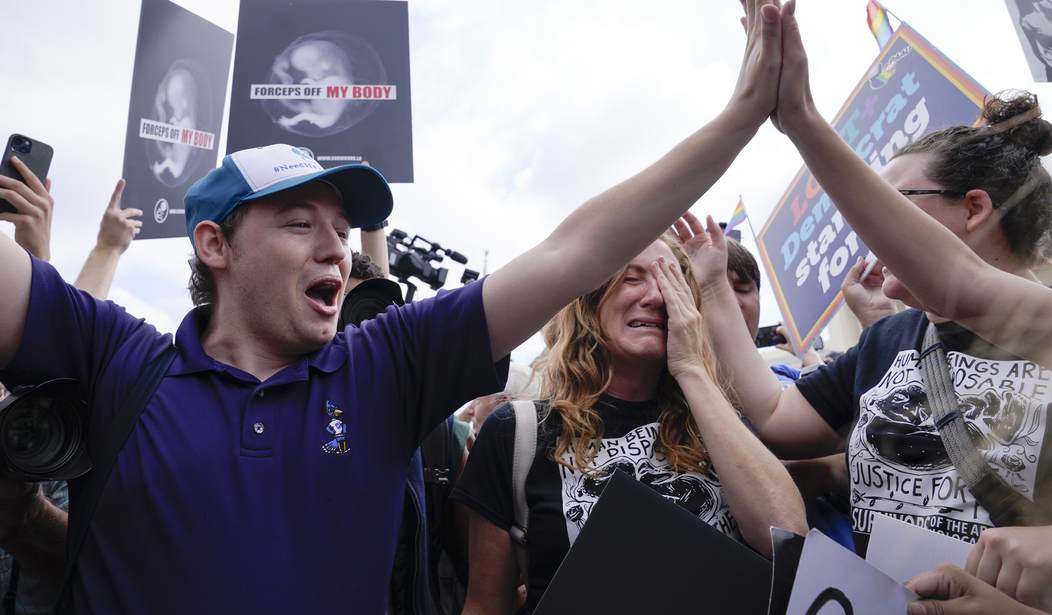In the desperate days of the Falklands War, the news that British forces had retaken South Georgia Island was received as a rare blessing in a season of defeat. Harried by press and media outside her residence, Prime Minister Margaret Thatcher had one simple message for them, and for the nation: “Just rejoice at that news.”
I think of that moment now, in the immediate aftermath of the tremendous victory — for life, for the Constitution, for America — in the Dobbs v. Jackson Women’s Health case at the Supreme Court. So many questions arise from it: questions of policy, questions of prudence, and questions of politics. But those questions, legitimate and pressing as they are, cannot obscure the essential core of the matter. Life won. The American system worked. A monstrous regime of half a century that sacrificed millions of our unborn children to the murderous demands of cruel calculus is over.
Just rejoice at that news.
Rejoice. Rejoice because this moment was never supposed to come. Think about the overwhelming forces arrayed against this victory. The received wisdom that killing a child in the womb was not only permissible but — most awfully — a positive good was enthusiastically endorsed by nearly every single major institution in America. It was a common view held by nearly every member of the media class. It was a touchstone of belief among nearly every member of academia. It was an accepted price of admission to Acela-Corridor social life. It was an article of faith for one of the two major political parties. It was endorsed by corporate activism — for example, whenever a major corporation would threaten a state that dared to pass a pro-life law.
Recommended
For half a century, support for the cruelty of the Roe regime was the price of admission to nearly every single commanding height of American society. In the past generation, that fanatical commitment rose to extraordinary levels, with the 1990s rhetorical concession of “safe, legal, and rare” — adopted by pro-abortion candidates wishing to obscure the depth of their commitment before pro-life voters — abandoned entirely. The new mantra was “shout your abortion,” making a celebratory act of a positive evil. Abortion became not a sacrament, but a mirrored perversion of one.
Standing against this overwhelming display of power were the American people. For half a century, ordinary Americans — churchgoers, people of faith, homemakers, small-town residents, and men and women of quiet conviction — worked against the might and power of the Roe regime. That regime did everything possible to deter them: it labored against them in all its spheres, derided them in media, denied them in business, defamed them in academia, and defeated them in governance whenever it could. But the regime, in all its might, could never quite win.
The American people kept coming. They kept working. They kept organizing. They kept praying. And as they did — across decades and across generations — they grew stronger. Americans organized Marches for Life across the country and drew millions to them. Americans insisted that movement-conservative orthodoxy include a commitment to life as a prerequisite — often against the wishes of “intellectual” movement elites. Americans elected pro-life candidates to office and demanded that they deliver. And Americans in the legal profession came together to form an organization deserving special mention now: the Federalist Society, which labored to undo the injustice imposed by the courts.
They did all this — and they kept it up across half a century. It was an act of faith, in the most pure sense. The activism, the work, and the prayer was an expression of faith in the value and righteousness of life. It was an expression of faith in something else, too: faith in America, faith in the redemptive workings of the American system, and faith in the American people’s power to still shape and secure their own country.
Their final great exertion, it turned out, was nothing less than the election of a President who pledged to appoint judges sympathetic to their goal. President Donald J. Trump kept his promise — and made nearly inevitable the victory we celebrate today. The victory is the cornerstone of his presidency that is still being written.
What does the end of Roe mean? It means more work to come: first and foremost in the states, which now take up the weighty question of how best to defend life. The fact of that work is a blessing, because it means we won the first and greatest triumph we had to win. It means our movement is real. It means our efforts and our sacrifices bore great fruit. It means the American people are still in charge of their own country.
It means millions of American children will live.
Just rejoice at that news.

























Join the conversation as a VIP Member